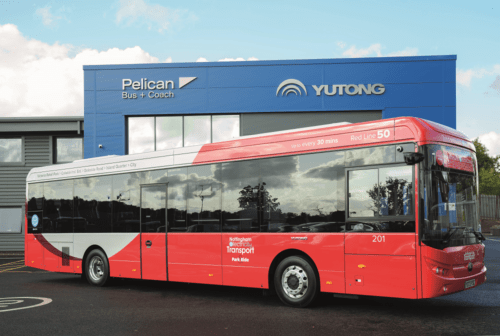
Nottingham City Transport is preparing for the arrival of its first electric buses by the end of the year
Nottingham City Transport’s first new electric buses are nearing completion and are expected to be carrying passengers on the city’s streets by the end of the year, the operator says, once driver and engineering training, along with the final infrastructure work take place at its Trent Bridge Garage, where they will be based, are all completed.
A total of 24 electric single-deckers have been ordered in the first batch, which will be split into two deliveries – 12 before Christmas and 12 more by the end of March 2024. Alongside the standard-fit air-conditioning, the buses will feature a re-positioned visual next stop screen, including a rear facing screen which can be seen from the wheelchair bay, extra leg room between seats, a bigger buggy bay, a hearing loop system, and full colour destination displays. Additionally, no tip up seats will be fitted in the wheelchair bay to help reduce conflict over use of the space.
With an expected range of over 250 miles, the operator says the buses will be able to manage a full day’s service without recharging.
The total cost of the first phase of NCT’s electric bus project, which includes both the buses and infrastructure, is £34m, of which £15.2m comes from the Department for Transport’s Zero Emission Bus Regional Areas (ZEBRA) fund. The remaining £18.8m is investment by the operator.
In a thorough and well-researched introduction to the new buses on its website, Nottingham City Transport said that it chose the Yutongs as they were the ones which best met its needs, and that having trialled other vehicles, it found some of those ‘disappointing.’ “NCT has a long track record of supporting bus building in the UK, although many are now owned by international companies. Our bio-gas buses were assembled and bodied in the UK, but their chassis was manufactured overseas. We undertook a rigorous public procurement process and operational trial of many electric buses. Some of those bus trials were disappointing and the buses just didn’t meet our needs and would likely have required more buses than we actually needed, as we’d have to swap and charge them during the day,” the operator explained.
“Yutong Bus & Coach were the clear winner, with tried and tested buses that are superior in terms of space and comfort for passengers, with air conditioning as standard. Their buses can do a full days’ operation on a single, overnight charge and come with advanced battery technology and safety systems.”

